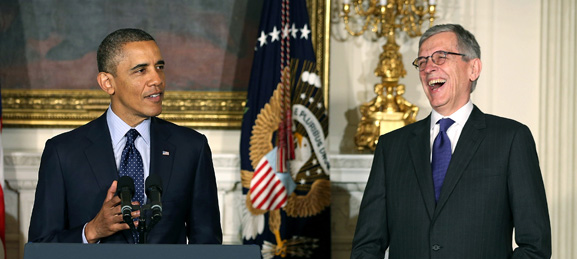When a federal court trashed its “net neutrality” compromise policy in January, the Federal Communications Commission assured us that the Internet we knew and depended on was safe. Most activists didn’t believe federal officials and this past week the FCC demonstrated how realistic our cynicism was.
The Commission announced last week that among its proposals on the Internet, due for full discussion on May 15, was one which would give access providers the right to sign special deals with content producers for connections that are faster and cleaner than the connections most websites use. It’s precisely the nightmare that court decision threatened.
In the predictable outcry and immediate debate over the FCC’s announcement, however, two major issues seemed to be lost.

To deliver this faster connection, the Internet giants will have to change the Net’s protocols, establishing a fast lane that completely destroys the technological basis of Internet neutrality. They will, effectively, be allowed to set up an alternate Internet.
At the same time, the announcements raise a question about the FCC’s role. To develop this proposal, it has obviously been talking to the very companies it is supposed to regulate and has written regulations based primarily on a concern about their ability to make lots of money.
Isn’t this the opposite of what federal regulation is supposed to do?
When the debate dust settles, it appears that not only may we lose the Internet as we know but we have no agency in government looking out for our interests.
The background has been covered on this website but, to recap:
Access (or service) providers offer connections to put you on the Internet and give you several speeds to choose from. They are mainly cable companies like Comcast and telecommunications companies like Verizon. Content providers use those connections to deliver what you want to see and read. Every website owner is a content provider, including biggies like Netflix.
Net Neutrality is the principle that service providers — like Verizon and Comcast — can’t discriminate in the delivery of content or provision of access based on user, content, site, platform, application, type of attached equipment, and modes of communication. If you go on-line, you can reach everything anyone else can. It was the law until this past January.
That was when a federal court struck down the provision finding that cable companies like Comcast weren’t subject to the neutrality rules that govern telephone companies and so net neutrality, based on the telecom industry’s practices, didn’t apply to high-speed providers. They are, after all, cable companies and anyone who subscribes to cable television with its multiple “programming packages” that give you a monthly dose of sticker shock knows there’s nothing “neutral” about cable.
In short, service provider companies can now charge content providers money to speed up their content delivery and the content providers can limit access to that faster content to people paying a higher price for it.
While the decision was based on cable company practice, it obviously benefits telecoms like Verizon who also offer high-speed service.
Apparently, the FCC wasn’t too unhappy either. Chairman Tom Wheeler (a former telecom industry lobbyist) reacted in stunningly triumphant terms, assuring us all that our access to the Internet will be completely protected. In fact, he said the ruling actually gives the FCC more regulatory power. This new proposal, carving out a slice of the Internet for rich corporations to operate more quickly and cleanly, was apparently what he meant.
In his defense of the current FCC plan, Wheeler explains that we would all still have access to everything on the Internet. The proposal, he explains, “will restore the concepts of net neutrality consistent with the court’s ruling in January.” But that January ruling threw Net Neutrality out the window and it’s clear that with this new proposal our access to certain content will be slower, more prone to start and stop “buffering” and less crisp than the faster connection unless we pay more for it.
It’s like the locksmith assuring us that our broken door lock will remain broken.
If that spasm of regulatory double-speak doesn’t provoke a groan, the argument by decision defenders will: they say that, while the companies will pay for the faster connection, no access provider will charge the consumer more for it.
But the content provider will. Obviously an outfit like Netflix is not going to offer this higher speed service that it is paying the access providers handsomely for to customers without charging them more for it. In fact, if past practice is any indication, even those of us who don’t or can’t pay for faster internet service we will all see our fees for watching this kind of on-line content rise, whether we’re watching it on the faster connection or not. Netflix pays Comcast more and charges the pass-along costs (with some profit mixed in): just the kind of hustle Net Neutrality was invented to prevent.
If the proposal is approved, as is expected, Net Neutrality will be buried. But the true threat to the Internet’s existence isn’t only the “pay for speed” proposal. To make this happen, providing companies will have to restructure their technology to allow for a faster “lane” on the Internet. There already are, of course, various speeds of “high-speed” service and that is maintained by the company’s determining which connecting server the customer is going to access. When you enter the Internet you are immediately connected to a server that handles outgoing and incoming traffic at a specific speed. If you pay for higher speeds, you get the higher-speed systems with their servers.
All of this, however, has up to now been handled at the user or customer level. The Internet itself remains the same. What the FCC is proposing is a new way of regulating speed. Now it is the content provider who is assigned a specific speed lane and any user who pays can access that high-speed content. To make this possible, the access provider will have to establish not a higher speed connection server but a completely separate connection to the Internet. This isn’t a faster lane on the highway; it’s a completely separate highway.
With that “alternate Internet” established, and with a small empire of developers continuously improving it, the power of providers to control all Internet content is now in place. They can start with Netflix, but they legally have power to channel any Internet content over that super-highway, leaving most content providers in the dust. That will certain include most websites your visit, including this one. As speed over the Internet improves with new technological development, guess where most of the development investment is going? As new streaming technology improves, content developers will have to pay to take advantage of it and most of us just don’t have that kind of money.
The impact is also international because the Internet has no national boundaries and the rules governing any U.S. based company apply to all its activities world-wide unless the government of a specific country objects. That objection will rarely happen because most governments won’t care or will take a pay-off (in the form of a tax payment or licensing fee) to shut up. In fact, governments all over the world can now treat this as another form of revenue.
This kind of corporate control over the Internet and our communications is frightening and control is what the corporations are seeking. It’s been the goal of every major company to control as much access as they can, growing their “user-base” and profits in the process. In fact, the prospect of a wide open internet has now attracted a couple of “data giants”: Google and Facebook. Each company is now developing technology to provide access to everyone on earth using signal bouncing balloons (in Google’s case) and drones and satellites (in Facebook’s). While both companies protest that their intentions are altruistic (providing Internet to all humans), the timing of their plans in light of this decision seem like the good old pursuit of profit.
Rhe main question isn’t whether these people will try to do this because that’s answered by their history: Of course they will. The question then is: What is the FCC doing about it?
This week, coalitions of Internet freedom activists were making plans to make their presentations before the FCC and to lobby Congress and to do letter-writing campaigns to just about any concerned person in government. All of this has proven to be important and useful work and it has ended in some successes in the past.
But why should any of us have to do this? Isn’t the very role of the FCC to protect and represent the public? While neo-con steroids that have been driving it for the last two decades, the FCC’s legal responsibilities remain the same: not to protect the interests of corporations but to protect our interests against corporations.
Clearly, with a proposal that represents corporate interests, the FCC isn’t doing any such thing. Some of us aren’t surprised; none of us should be.










